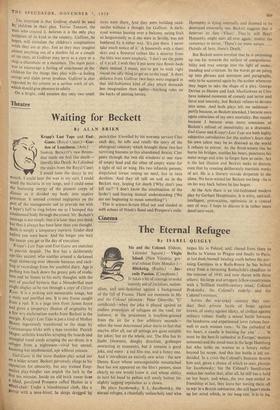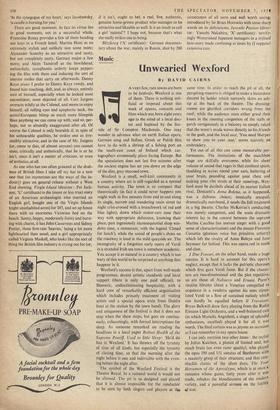As a rule they stand stockstill. The speaker of the
moment is the only one who is allowed a little gesture. . . . When they do move, it is without premeditation, at hap-hazard, even with a little natural clumsiness, as of people who arc not, conscious of being stared at in public.
The contrast with the present day—when pro- ducers tend either to look on the actors as puppets, to be moved around in order to secure elegant stage effects; or to encourage them to live their parts, so that everybody on stage is muttering or twitching or performing in some manner—could hardly be greater. The Fays, ad- mittedly, taught stillness partly out of necessity, because their trainees were amateurs; but it turned out to have great virtue in its own right. Wherever an author has something to say, be he a Shaw or a Synge (or for that matter a Shakespeare), the actors can thereby get out of his way—as it were; and instead of trying to interpret the author, allow him to speak through them. The effect, especially when the author is speaking through, say, a Sarah Allgood, could be a revelation.
In Mr. Fay's anxiety (would that it were more common) not to allow his detachment to be blinded by a rush of guff to the head, he hardly does full justice to the profound effect this style had on audiences, tiny though the audiences often were. There is a hint of it in the Winifred Letts verse, which he quotes :
Sixpence the passport to this splendid world Enchanted, sad, or gay,
but not much more than a hint. Perhaps this is
MICHEL BUTOR'S La Modification, now translated by Jean Stewart With the title Second Thoughts, is the story of a middle-aged French family-man :s journey from Paris to Rome. He has often matte the journey before, on business and in luxury. But this time is different : for this time he iS, going only to see his mistress, and to tell her that he has finally arranged for her to come and live with him in Paris. And in order to mark the non- business-like nature of the occasion, he is travel- ling third class—not only for the sake or discretion, but also (after all, he is a French family-man) for the sake of saving money. The book begins at the Gare de Lyon, ends at Roma Termini; and it consists of a minute-by-minute account of the hero's thoughts and actions during his entire twenty-one hours in the train. The thoughts are largely of his own past and future and, more particularly, of past journeys remem- bered, future journeys anticipated, in either direc- tion on this same line. Since, furthermore, the method of narration is one whereby the hero tells the story to himself, both describing and addressing himself as 'you,' there is more thall a little confusion—which is rendered more genie but is in no way lessened by the hundred and one past, present and future meals which 'you' absorbs with gusto in the restaurant car. Having remarked this, however, and having also remarked a' tiresome trick of ending lora: graphs, sometimes several paragraphs at a streten., with commas or subordinate stops, I feel bons, to say that this is one of the most interesting novels (as opposed to exciting, entertaining vc. moving novels) that I have read for a long time This for two reasons. Firstly, M. Butor has caught the flavour of travel : he succeeds brilliantlY111. catching Dijon, say, half-seen on a rainy nt°101, ing, Modana as it appears from a fuggY er/„ci partment in the gathering dusk. Secondly, more important, there is something almost .'„,s cannily intriguing in the process of the he"'
MONEY MATTERS
Investing for Safety is downright Common Sense
Assuming you have Capital—a few hundreds of pounds, maybe a. few thousands. Bow is it. invested Y Specula-. tively in the hope of Capital gains— forgetting the possibility of Capital losses ; or safely, holding tight. to what you have Y That's a money matter—a money problem—of utmost importance. Because money matters in another sense too.
It matters very much to you that the Capital you have remains intact : t hat you can withdraw it without loss whenever you like. Also that it should earn generous tax-paid Interest. In vestors, and savers of small amounts, will find in the Planet Building Society, established in 1848 and with present assets of £10,000,000 and large reserves, a very safe alai very profitable answcr 1., their money problems.
3 4 0 NET PER ANNUM equal to 61% on investments taxable at standard rate
The Society pays the Income Tax Facilities for immediate withdrawal
Write for details
THE PLANET BUILDING SOCIETY Planet. House, Finsbury Sq., London, E.C.2 Tel; Monarch 8985
(Member of The Building Societies Association)
Landscape and Marine Painting
By Claude Muncaster, R.W.S., R.0.1., R.B.A., P.S.M.A. Kx ' •
•



































 Previous page
Previous page